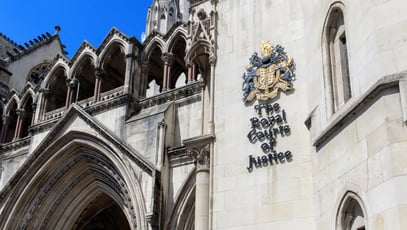This month’s Red Flag Bulletin includes the following stories:
- New UK sanctions regime targets 20 Saudi nationals involved in Khashoggi murder;
- Hundreds of arrests across Europe after French police penetrate encrypted communications platform; and
- Ukrainian authorities arrest three over USD 6 million bribe to close a criminal case against Burisma owner.
Europe
Germany: Wirecard files for insolvency following fraud revelations
Wirecard AG, a German publicly-listed payment processing company, filed for insolvency in late June after it admitted that EUR 1.9 billion of cash on its balance sheet did not exist, and that it had fraudulently inflated sales and profit figures for over a decade. Wirecard’s former CEO, Markus Braun, was arrested on suspicion of false accounting and market manipulation. The collapse of Wirecard has amplified criticism of both regulators and audit firms. BaFin, the German financial regulator, is under investigation by the European Securities and Markets Authority, the EU financial watchdog, over its failure to detect Wirecard’s fraud. EY, Wirecard’s auditor, has come under scrutiny following reports that the company failed to confirm Wirecard’s cash holdings with a Singaporean bank between 2016 and 2018.
France, UK, Netherlands: Arrests across Europe following penetration of encrypted communications network
Police in France, the UK, the Netherlands, and a number of other European countries carried out hundreds of arrests in late June and early July, targeting organised criminal groups. The arrests came after French police penetrated the network of EncroChat, an encrypted phone service provider widely used by such groups, whose operating system worked on specially customised phones. A coordinated international operation based on information derived from monitored communications on EncroChat resulted in the arrest of hundreds of suspects, and the seizure of significant quantities of weapons and drugs. The UK’s National Crime Agency reports that UK law enforcement agencies seized a total of GBP 54 million in cash, while Dutch police reported seizing EUR 20 million.
Middle East & North Africa
Algeria: Businessmen and former politicians jailed in corruption case
In late June and early July, an Algerian court sentenced several former politicians and businessmen to long prison sentences for misappropriation of state funds and corruption, and issued court orders to seize their assets. Many of those sentenced were senior allies of former President Abdelaziz Bouteflika, who was deposed in 2019 amid countrywide anticorruption protests. The rulings included an 18-year prison sentence for Ali Haddad, a construction tycoon whose four brothers also received four-year jail terms. Two former prime ministers, Ahmed Ouyahyia and Abdelmalek Sellal, were both sentenced to serve 12 years in prison, and eight former cabinet ministers were also jailed. The Bouteflika regime has long been accused of corruption and cronyism, but the sentences are a significant step by the post-Bouteflika government towards dismantling the patronage networks that characterised the former regime.
Saudi Arabia: New UK sanctions target those accused of involvement in Khashoggi killing
In July, UK foreign secretary Dominic Raab announced new sanctions against 20 Saudi nationals accused of being involved in the 2018 murder of Saudi journalist Jamal Khashoggi. The order forms part of a wider “post-Brexit” sanctions regime that has seen the designation of foreign nationals involved in human rights violations. Many of the Saudi nationals sanctioned by Raab had previously been designated by the US in 2018, including Saud Al Qahtani, a senior aide to Crown Prince Mohammed bin Salman (MbS) who is believed to have authorised the Khashoggi murder. However, the UK has gone further than the US in adding to its list Major General Ahmad Al Asiri, a senior aide to MbS and the former deputy head of the Saudi intelligence services. All of the sanctioned individuals have had their UK assets frozen and have been placed under a UK travel ban.
Asia Pacific
South Korea: Samsung heir avoids arrest over ongoing fraud charges
In June, a South Korean court denied an arrest warrant for Jay Y Lee, vice chairman of Samsung Electronics, on longstanding accusations of accounting fraud and stock manipulation. Lee was convicted in 2017 of bribery, embezzlement, hiding assets, and perjury after he was found to have paid USD 35.7 million to non-profit foundations owned by a friend of the country’s former President Park Geunhye (2013-2017). In return, Lee allegedly secured shareholder support from the government pension fund for a controversial merger that was key to securing his control of Samsung and future succession as group chairman from his father, Lee Kun-hee. The scandal led to Park’s removal as President and her imprisonment. While Park has now served two years of a 25-year sentence, Lee only served one year before his original five-year sentence was halved and later suspended. Despite having avoided arrest, proceedings relating to the case are ongoing and Lee could face re-imprisonment.
Sub-Saharan Africa
DRC: Swiss prosecutor opens criminal investigation into Glencore
In June, the Office of the Attorney General of Switzerland opened a criminal investigation into the Swiss mining and commodities trader Glencore PLC over its failure to implement organisational measures to prevent alleged corruption in its operations in the Democratic Republic of Congo (DRC). The investigation follows the Swiss prosecutor’s 2019 probe into possible corruption at Glencore, prompted by a public interest group’s complaint against the company in 2017 regarding the possible bribery of foreign officials. Glencore is also under investigation by the UK’s Serious Fraud Office and the US Department of Justice. Its activities in the DRC have been subject to scrutiny over its links to US-sanctioned Israeli billionaire Dan Gertler, who allegedly acted as a middleman between the company and the DRC’s former President, Joseph Kabila, in order to secure mining contracts.
South Africa: First arrests in VBS Mutual Bank scandal
In late June, South African prosecutors arrested nine individuals for their alleged involvement in the collapse of VBS Mutual Bank, a South African bank which folded in 2018 following allegations that its shareholders, executives, and public officials misappropriated ZAR 1.9 billion (USD 218 million) from its reserves between 2015 and 2018. Those arrested include various senior bank executives and directors, its external audit partner, two officials of South Africa’s state-owned asset management company that held a stake in the bank, and the acting CFO of a local municipality that illegally invested ZAR 50 million in VBS. More arrests are anticipated in the coming months and will likely form part of a major and widely-publicised prosecution.
Russia/CIS
Ukraine: Authorities arrest officials for record USD 6 million bribe linked to Burisma owner
In June, Ukraine’s National Anti-Corruption Bureau (NABU) arrested three individuals who had offered a USD 6 million bribe to close a criminal case against Mykola Zlochevsky, a former Ukrainian natural resources minister and owner of Burisma Holdings, the Ukrainian gas company which featured prominently in the 2019 impeachment inquiry into US President Donald Trump. According to NABU, the bribe, which is the largest ever seized in Ukraine, was offered in exchange for dropping embezzlement charges against Zlochevsky relating to his tenure as a minister between 2010 and 2012. The three individuals detained, including the first deputy chief of the State Traffic Police, were allegedly proxies for Zlochevsky. The Ukrainian businessman fled Ukraine in 2014 after the authorities opened several criminal cases against him. NABU emphasised that the ongoing embezzlement case was not directly related to Burisma and did not involve Hunter Biden, who was a board director at Burisma until April 2019. Burisma denied any connections to the alleged bribe.
Kyrgyzstan: Former President receives 11-year prison sentence for corruption
In June, a Bishkek court sentenced Almazbek Atambayev, Kyrgyzstan’s President between 2011 and 2017, to 11 years in prison on corruption charges. Atambayev was jailed for unlawfully authorising the release of Aziz Batukayev, a Chechen organised crime figure, from a Kyrgyz prison in 2013. Atambayev had ordered Batukayev’s release, midway through a 16-year sentence, on medical grounds after he was diagnosed with leukaemia. An investigation in 2019 revealed that this diagnosis had been forged. Atambayev has denied the allegations, claiming that they are politically motivated, and a result of a personal conflict with Sooronbay Jeenbekov, the current President. Atambayev was arrested in August 2019 and is facing several other criminal charges, including abuse of office, murder, and organising a government coup.
Americas
Cayman Islands: Register of beneficial ownership to be in place by 2023
In July, the UK government announced that the Cayman Islands and seven other overseas territories had committed to introducing publicly accessible registers naming the beneficial owners of companies, which it expected to be in place by 2023. The UK hopes that the British Virgin Islands will now follow suit. Several weeks earlier, Cayman Islands lawmakers introduced legislation to strengthen its legal framework covering anti-money laundering and counter-terrorism financing. The new measures included stricter administrative penalties for violations of beneficial ownership regulations increased transparency requirements for individuals conducting trustee services as a business. The Cayman Islands is currently undergoing an AML re-rating application procedure with the Caribbean Financial Action Task Force (CFATF), which has criticised the country’s transparency on beneficial ownership. The CFATF’s decision on re-rating the Cayman Islands is set to be announced in October.
Mexico: Tax fraud charges brought against multinationals
In June, the head of Mexico’s Tax Administration Service, Raquel Buenrostro, began imposing criminal charges on multinational companies alleged to have committed tax fraud in the country. Buenrostro took office in January and is showing less leniency than companies had come to expect from her predecessors. Buenrostro was appointed by Mexican President Andrés Manuel López Obrador (2018-present), who has promised to combat corruption and tax fraud in Mexican industry. López Obrador claims that 15 unnamed large companies currently owe approximately USD 2.3 billion in back taxes to the Mexican state. Buenrostro’s strategy appears to have been largely successful, as large taxpayers have paid nearly USD 1 billion more in taxes from January to May of this year, than they did throughout 2019.
Venezuela: Supreme Court ousts leaders of opposition parties
In June and July, Venezuela's Supreme Court, loyal to President Nicolás Maduro, restructured the country's electoral commission and ousted the leaders of three opposition parties, ahead of parliamentary elections expected later this year. Maduro is seeking control of the country’s National Assembly which has been in the hands of the opposition since the December 2015 election, following 15 years of Chavista hegemony. Among those ousted is Juan Guaidó, the leader of the Popular Will party, who is recognised by the US and 60 other countries as Venezuela’s interim President. Opposition leaders denounced the move as an attempt to rig the election. Guaidó said that they would not recognise the decision.




